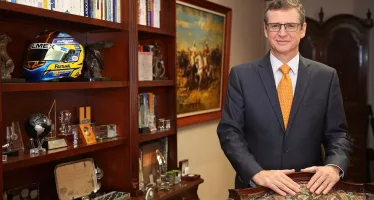Klaus Schwab – Portrait of a Man on a Mission

Klaus Schwab. Bloomberg/Getty Images
Long before Google came up with the motto, Don’t Be Evil was the sort of maxim Professor Klaus Schwab regularly employed to remind students and businesspeople of their responsibilities beyond turning a profit. Prof Schwab (76) advocates for the stakeholder concept which argues that the most efficient way to pursue one’s own interests is to incorporate those of all others affected by the endeavour.
Simple though it seems, the idea that cooperation beats confrontation has become the premise of a business philosophy now gaining traction globally. The stakeholder concept rests at the heart of sustainability which, in turn, encompasses three considerations: environmental, social, and governance (ESG). The excitement sustainability currently elicits amongst corporate leaders and politicians alike is – if nothing else – proof that the German professor was right all along. Others were perhaps just a bit slow on the uptake.
Now that the wider world seems to have caught up with him, Prof Schwab again surges ahead concluding, perhaps rather boldly, that, “capitalism, in its current form, has no place in the world around us.” Though readily admitting that capitalism is not yet broke, Prof Schwab does think it needs plenty fixing. For one, capital is gradually losing its pre-eminence as a factor of production. It is being replaced by the forces of innovation. As talent gains in importance, money becomes less relevant. Prof Schwab expects this shift to impact economics worldwide and ultimately result in an ideology that emphasises personal freedom and social responsibility as drivers of development.
Ivory Towers Exit
Professor Klaus Schwab is a man on a mission. He wants to make the world a better place by appealing to common sense rather than political dogma. Though a science not yet fully understood, economics – the art of making a living – holds the key to humanity’s advancement. Not partial to small-scale thinking or a life of pondering spent within the confines of academia’s ivory towers, Prof Schwab set out in 1971 to improve the world around him.
“Prof Schwab’s outsized success in creating a neutral platform for thought and action, brought a new, and perhaps unexpected, set of challenges to the fore.”
The epic journey that followed started innocently enough with a meeting of 444 business leaders at the Davos Congress Centre to discuss inclusive management styles. Thus, the European Management Forum came into being – the forerunner of the World Economic Forum (WEF). The venue was well chosen as a stage for transformation: in 1928 Albert Einstein visited the resort town – then a sanatorium for tuberculosis patients – and delivered a landmark lecture on his Theory of Relativity.
Klaus Schwab – from 1969 to 2002 first lecturer and then professor in Business Policy at the University of Geneva – soon broadened the scope of the annual get-togethers in Davos to include economic and social issues, and later still, politics. The World Economic Forum in its present form got its start in 1987 and, under Prof Schwab’s stewardship, has grown into a global organisation employing some 500 staff and mobilising many thousands in networks, councils, and platforms – all aimed at facilitating cooperation through the exchange of ideas and experiences.
Common Ground
The Davos formula of success is based on impartiality. The annual meeting is not a stage for waving flags or broadcasting convictions – it is a common ground. Prof Schwab’s outsized success in creating a neutral platform for thought and action, brought a new, and perhaps unexpected, set of challenges to the fore.
Size, it would seem, is a mixed blessing. With an annual budget of about $200 million, offices in New York and Beijing besides its headquarters in Cologny near Geneva, and organising numerous large events around the world, the WEF has a reach stretching far beyond Davos. The foundation is sponsored by a hundreds of member companies that each contribute to the budget annually, either as “strategic partners” (SFr 500,000) or “industry partners” (SFr 250,000). In return for their investment, the corporate sponsors receive exposure, media support, and a seat on discussion panels. They also get to be part of the ultimate forum for movers and shakers.
In a rare unguarded moment, Prof Schwab in January 2014 sighed that he must “constantly fight” to keep corporate interests from setting the agenda of the Davos meeting and dominating the proceedings. “We fight the commercialisation of the meeting. The forum is a great place precisely because business leaders are reminded that they have to take global public interest into account.” Prof Schwab realises that quite a few captains of industry see Davos merely as a place to meet with, and fête, potential clients and conduct business. Still, he hopes that the message get through. It often does, although not always in the way it was intended to.
Beyond Globalisation
Just as most politicians only understand the countercyclical spending part of Keynesianism, most corporate participants of the Davos meetings seem to have ears only for the globalisation bit of the message. This gave rise to the Davos Man, a name coined by the conservative US political scientist Samuel P Huntington in 1977 to describe global elites who have no use for either borders or governments and thrive in a climate where states wither as their demise facilitates the emergence of a transnational elite.
This was not quite the force Prof Schwab had intended to unleash with the World Economic Forum. In fact, Prof Schwab seems quite uncomfortable with the Davos Man whose, at times deplorable, antics have given globalisation a bad rap it did not deserve. Indeed, one of the main topics a`t the upcoming meet in Davos concerns the threats to global economic integration from a rise in sectarianism, political isolationism, and nationalism.
The 2015 Davos summit is, however, one that may signal change and see the debut of the Modern Davos Man who is much more aware of social responsibilities than his predecessor ever was. Prof Schwab is actively looking to redefine the Davos Man into someone more in tune with his own stakeholder concept.
As it happens, the time seems right for such a makeover: corporate social responsibility and sustainability are becoming more than just the obligatory footnotes in annual reports. Corporations worldwide are finding that embracing such esoteric values, and elevating them to guiding principles, actually helps solidify bottom-lines. Cooperation is an improvement over confrontation and translates into bigger profits down the line. And those profits will now benefit all stakeholders, rather than just the select few holding the purse strings.
As the 45th Annual Meeting of the World Economic Forum gets underway, the circle is almost complete and Prof Schwab may yet see his original stakeholder concept vindicated. The Modern Davos Man – paradoxically a throwback to earlier times as much as the harbinger of an improved world – may yet rise to the occasion.
You may have an interest in also reading…
Evan Harvey, Nasdaq: Emerging Markets Leverage ESG Strategy
Over the last decade, emerging market exchanges (EMEs) have outperformed the rest of the world in a few key ways
Brain Capital: An Emerging Investment Opportunity
To solve existential brain challenges spanning neurology, mental health, psychiatry education, workforce development, and neuroscience, we need a fresh approach
Vector Casa de Bolsa: Five Decades Driving the Growth of the Mexican Economy
As Vector Casa de Bolsa approaches its 50th anniversary, it is time to reflect on the company’s remarkable journey and enduring impact


















































































